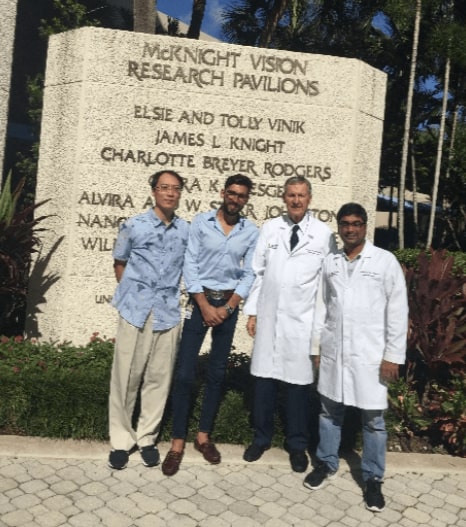Bascom Palmer Eye Institute
University of Miami
Blindness in glaucoma is the result of the death of certain nerve cells called Retinal Ganglion Cells (RGCs). This death may not be immediate, but is often preceded by a period where the cells gradually lose functionality. The goal of this research is to ultimately lead to new Glaucoma treatment regimens that are based on directly preventing or slowing down the loss of functionality to these sight critical nerve cells, rather than reducing intraocular pressure (IOP) as is the normal goal of current treatment procedures. This study tested the hypothesis that the lifespan of functional RGCs in mouse glaucoma could be extended by preconditioning RGCs in early stages of the disease using a minimally invasive treatment with retrobulbar lidocaine. Retrobulbar lidocaine is a commonly used anesthetic for eye surgery.

The study was conducted using mice from a population which often develops age-related IOP elevation and glaucoma. (Mice are often used in Glaucoma laboratory research as their eye structure and functioning are quite similar to human eyes.) At 4 months of age, before the onset of glaucoma, mice started receiving lidocaine injections in one eye. As the mice aged, the effectiveness of this “preconditioning” was compared to a control group. When glaucoma becomes manifest, the effectiveness of lidocaine preconditioning was assessed in the treated eyes. RGC survival was improved by 35%. It is interesting to note that the lidocaine treatment did not alter the age-related increase of IOP.
These results were published in J Mol Sci 2018. Results provide a proof of principle that neuroprotection in glaucoma can be achieved by preconditioning the eye with using a minimally invasive treatment.

Dr. Vittorio Porciatti Dsc, FARVO
Anesthetic Preconditioning as Endogenous Neuroprotection in Glaucoma
James L. Knight Professor
Vice Chair, Director of Research
Bascom Palmer Eye institute
University of Miami Miller School of Medicine
Phone: 305-326-6050
Email: vporciatti@med.miami.edu

 DONATE NOW
DONATE NOW